Audi Q6 e-tron VS Dacia Spring
Audi Q6 e-tron
The Audi Q6 e-tron represents a significant step forward in the realm of electric vehicles, offering a perfect blend of cutting-edge technology and timeless design. With its spacious interior and advanced infotainment system, it provides both comfort and connectivity for the modern driver. The Q6 e-tron embodies Audi's commitment to sustainability without compromising on performance or luxury.
more informationDacia Spring
The Dacia Spring stands out as an affordable and environmentally friendly option in the electric vehicle market, combining practicality with a compact design ideal for urban settings. Its minimalist interior, while basic, provides all the essential features needed for a comfortable drive, reflecting its cost-effective approach. The vehicle's performance suits city driving, making it an appealing choice for those seeking an entry-level electric car.
more information @ audi-mediacenter.com
@ audi-mediacenter.com
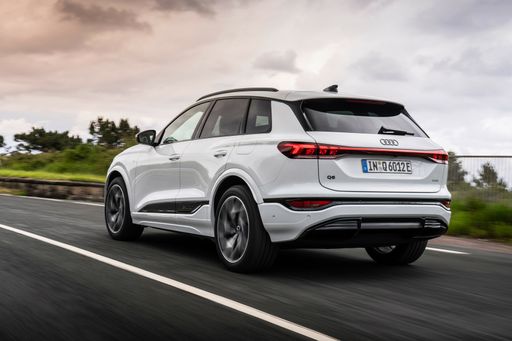 @ audi-mediacenter.com
@ audi-mediacenter.com
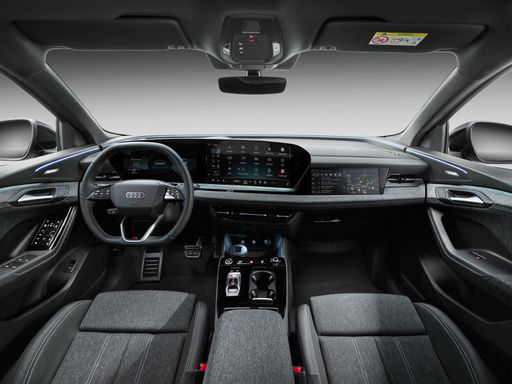 @ audi-mediacenter.com
@ audi-mediacenter.com
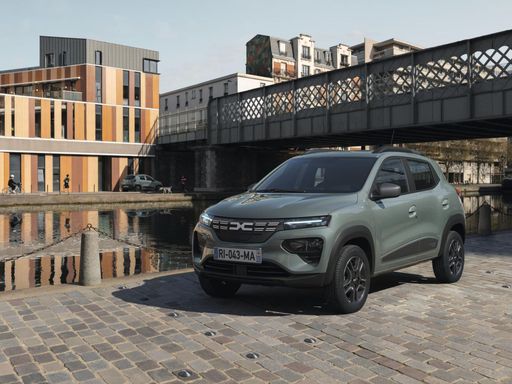 @ dacia-presse.de
@ dacia-presse.de
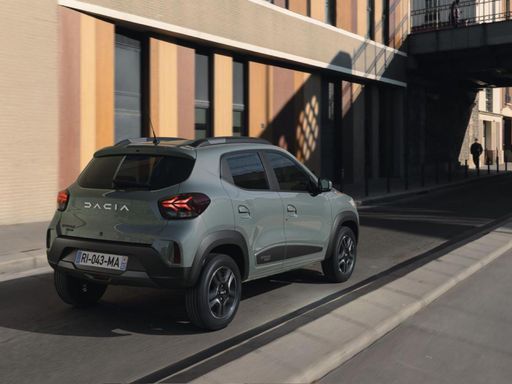 @ dacia-presse.de
@ dacia-presse.de
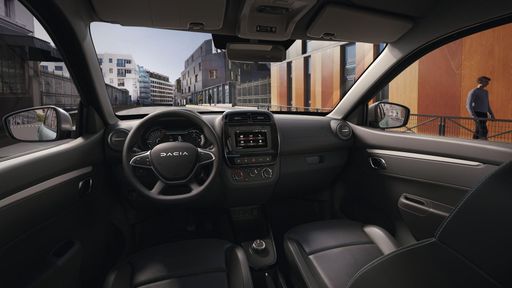 @ dacia-presse.de
@ dacia-presse.de
Costs and Consumption |
|
|---|---|
|
Price
about 54400 - 91900
£
|
Price
about 14500 - 17100
£
|
|
Consumption L/100km
-
|
Consumption L/100km
-
|
|
Consumption kWh/100km
15.6 - 18.9
kWh
|
Consumption kWh/100km
13.2 - 14.1
kWh
|
|
Electric Range
482 - 656
km
|
Electric Range
225 - 228
km
|
|
Battery Capacity
75.8 - 94.9
kWh
|
Battery Capacity
26.8
kWh
|
|
co2
0
g/km
|
co2
0
g/km
|
|
Fuel tank capacity
-
|
Fuel tank capacity
-
|
Dimensions and Body |
|
|
Body Type
SUV
|
Body Type
SUV
|
|
Seats
5
|
Seats
4
|
|
Doors
5
|
Doors
5
|
|
Curb weight
2200 - 2425
kg
|
Curb weight
1030 - 1050
kg
|
|
Trunk capacity
499 - 526
L
|
Trunk capacity
308
L
|
|
Length
4771
mm
|
Length
3701
mm
|
|
Width
1939 - 1965
mm
|
Width
1583
mm
|
|
Height
1665 - 1685
mm
|
Height
1519
mm
|
|
Payload
540
kg
|
Payload
265 - 285
kg
|
Engine and Performance |
|
|
Engine Type
Electric
|
Engine Type
Electric
|
|
Transmission
Automatic
|
Transmission
Automatic
|
|
Transmission Detail
Reduction Gearbox
|
Transmission Detail
Reduction Gearbox
|
|
Drive Type
Rear-Wheel Drive, All-Wheel Drive
|
Drive Type
Front-Wheel Drive
|
|
Power HP
292 - 516
HP
|
Power HP
44 - 65
HP
|
|
Acceleration 0-100km/h
4.3 - 7
s
|
Acceleration 0-100km/h
13.7 - 19.1
s
|
|
Max Speed
210 - 230
km/h
|
Max Speed
125
km/h
|
|
Torque
450 - 855
Nm
|
Torque
113 - 125
Nm
|
|
Number of Cylinders
-
|
Number of Cylinders
-
|
|
Power kW
215 - 380
kW
|
Power kW
33 - 48
kW
|
|
Engine capacity
-
|
Engine capacity
-
|
|
Top speed
210 - 230
km/h
|
Top speed
125
km/h
|
General |
|
|
Model Year
2024 - 2025
|
Model Year
2024
|
|
CO2 Efficiency Class
A
|
CO2 Efficiency Class
A
|
|
Brand
Audi
|
Brand
Dacia
|
Audi Q6 e-tron
Introducing the Audi Q6 e-tron: A Step into the Future of Electrification
The Audi Q6 e-tron marks a significant stride forward in the electric vehicle sector, cementing Audi's commitment to innovation and sustainability. This state-of-the-art SUV combines luxury, performance, and cutting-edge technology, catering to the eco-conscious driver without compromising on power or style.
Design Meets Functionality
The Audi Q6 e-tron showcases a sleek design aesthetic common in the Audi lineage. With a length of 4771 mm, it strikes an imposing presence on the road, combining practicality with sophisticated styling. It features a spacious interior that comfortably seats five and offers a generous boot capacity of 514 to 526 litres, making it perfect for both everyday commutes and longer journeys.
Advanced Powertrain Options
The Audi Q6 e-tron comes with a variety of powertrain configurations, reflecting the brand's push towards greater innovation in electric mobility. With a power range between 292 to 516 PS and a torque spread of 450 to 855 Nm, the vehicle promises an engaging driving experience. The electric drivetrain offers two modes of propulsion: rear-wheel drive for more traditional handling and all-wheel drive for enhanced traction under diverse driving conditions.
Efficiency Meets Performance
In terms of efficiency, the Audi Q6 e-tron competes strongly, leveraging advanced battery technology to deliver a range between 482 and 637 kilometres on a single charge, depending on the model. Consumption averages between 16.2 to 18.9 kWh per 100 km, showcasing Audi's commitment to minimal environmental impact. The model's CO2 efficiency class stands at A, highlighting its eco-friendly credentials.
Innovative Technology and Features
The Q6 e-tron is equipped with a host of innovative technologies that enhance both comfort and ultimate control. The vehicle is characterised by Audi’s virtual cockpit, offering intuitive infotainment controls along with a premium sound system. Safety and driver assistance systems are state-of-the-art, incorporating adaptive cruise control, lane assist, and park assist, ensuring peace of mind on every journey.
Acceleration and Speed
A performance enthusiast's dream, the Q6 e-tron accelerates from 0 to 100 km/h in an impressive 4.3 to 7 seconds, contingent on model specification. It boasts a top speed of 210 to 230 km/h, providing the thrilling dynamics typical of Audi's high-performance vehicles.
Electric Vehicle Infrastructure
With varying battery capacities from 75.8 to 94.9 kWh, the Q6 e-tron supports fast charging, making long-distance journeys more feasible than ever before. The advanced energy recuperation system further enhances battery efficiency, maximising range and reducing charging downtime.
A Cost-Effective Investment
The Audi Q6 e-tron presents not just a vehicle but a viable economic investment over the long haul. With a cost structure that spans €63,500 to €104,800, along with monthly running costs ranging from €1,426 to €2,038, it balances premium quality with a sustainable economic footprint.
Conclusion: A New Era of Driving
The Audi Q6 e-tron represents a new chapter in the evolution of electric SUVs, marrying performance with sustainability. As the industry moves toward a greener future, Audi drives forward with innovative design and groundbreaking technology, ensuring that the Q6 e-tron is not just a vehicle but a visionary statement for the future.
Dacia Spring
The Revolution of Affordable Electric Mobility: The Dacia Spring
The automotive world has witnessed remarkable advancements in electric vehicles (EVs), with the Dacia Spring emerging as a noteworthy contender in the affordable segment. Combining efficiency, affordability, and practicality, the Spring offers an intriguing prospect for eco-conscious individuals and city dwellers alike.
Powertrain and Performance: A Look Under the Hood
The Dacia Spring is equipped with an electric motor that delivers between 44 to 65 PS, translating into a versatile driving experience tailored to urban landscapes. It operates on a front-wheel-drive system, ensuring a familiar and manageable handling experience.
Dacia Spring's electric engine is paired with an automatic transmission, utilising a reduction gearbox. This setup allows for smooth acceleration and a top speed of 125 km/h, ensuring that everyday driving scenarios are handled with ease.
Efficiency and Range: Eco-Friendly without Compromise
Efficiency is a cornerstone of the Dacia Spring's design, boasting an energy consumption of just 13.2 to 14.1 kWh per 100 km. When fully charged, its 26.8 kWh battery offers a respectable range of 225 to 228 km, making it ideal for daily commutes and short trips.
Furthermore, the Spring takes pride in its commendable CO2-efficiency class A, emphasising its commitment to reducing environmental footprint with a zero-emission profile.
Design and Practicality: Compact yet Comprehensive
Lying in the SUV category, the Dacia Spring is compact with dimensions of 3701 mm in length and 1583 mm in width, making it a perfect match for urban environments where space is at a premium. Despite its modest size, it provides a generous boot space of 308 litres, ensuring practicality isn’t sacrificed.
Comfort and Interior: For the Everyday Journey
The Dacia Spring comfortably seats up to four passengers. The cabin offers a minimalist yet functional design, available in multiple trim lines including Essential, Expression, and Extreme, allowing customers to choose according to their taste and requirement.
With its ergonomic layout and simplicity, the interior is crafted to enhance the driving experience by focusing on essential needs, avoiding unnecessary distractions.
Affordability and Accessibility: Breaking Barrier
The Dacia Spring stands out in the electric vehicle market due to its affordability, with prices ranging from 16,900 to 19,900 €. This ensures that environmentally friendly transportation is accessible to a broader audience.
Additionally, the Spring allows for cost-effective maintenance and operational expenses, offering monthly running costs between 570 to 599 € and cost per km between 22.8 to 24 cents, making it an economical choice in the long run.
Final Thoughts: The Future of Urban Mobility
In summary, the Dacia Spring serves as a testament to how electric vehicles can be both affordable and practical, without compromising on essential features. Whether it is for the eco-conscious urbanite or those looking for a cost-effective daily driver, the Spring is positioned as a viable solution for navigating the future of urban mobility.
